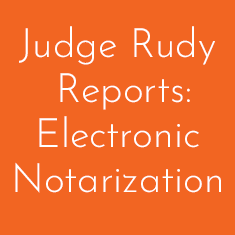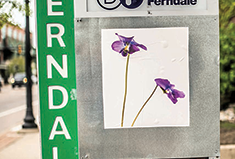Judge Rudy Reports: Electronic Notarization
By Rudy Serra
Q: I WAS TOLD THERE IS A NEW LAW that allows papers to be signed electronically. What if I need a document notarized? Do I still have to personally appear before a notary public?
Answer: Michigan law now allows documents to be notarized electronically. Notaries are not required to make arrangements to do their deed by computer, but they are authorized to do so. In order to notarize documents remotely, a notary has to use a service that has been approved by the State’s “Office of the Great Seal.”
The Secretary of State published this helpful information about the approved vendors:
• E-Mortgage Law – Offers electronic notarizations services.
• Nexsys – Offers both electronic and remote notarization services.
• Pavaso – Offers both electronic and remote notarization services.
• NotaryCam – Offers both electronic and remote notarization services.
Because only approved vendor systems can be used in Michigan, a notary wishing to provide these services must use one of the vendors above. Otherwise, a notary should still use the pen and ink method.
Any person who can obtain a $10,000 notary bond from an insurer can be a notary. Licensed attorneys are exempt from the bond requirement. There is a ten-to-twenty dollar fee for filing the bond with the County Clerk and an additional ten dollar application fee. The new on-line application asks about electronic notary services and asks the applicant to identify one of the approved vendors if they wish to provide that service.
Unless they are being reimbursed for costs of travel, a Notary Public in Michigan should not charge more than ten dollars to notarize a document. Many attorneys, banks, insurance companies and others provide public notary service free. Serra Services P.L.L.C., for example, provides free public notary service.
The title “notary public” simply means a public notary. A notary acts as an impartial witness of a signature. When a document is notarized, the notary is certifying that they were present when the document was signed, that they knew or identified the person signing, and that they saw the person sign.
JUDGE RUDY REPORTS is a regular feature in Ferndale Friends. We welcome questions from readers. If you have a legal question or concern, send your question by email to rudy.serra@sbcglobal.net. Advice about specific cases cannot be provided but general legal questions and topics are welcome.



